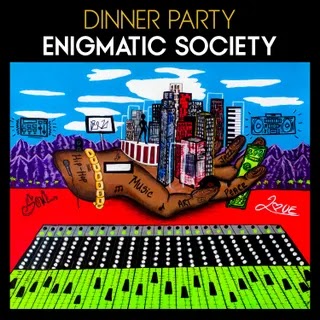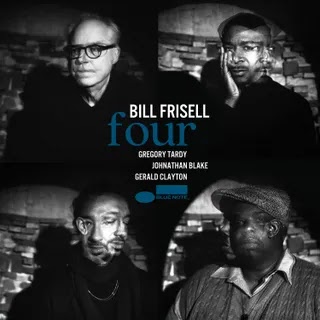Holed up in their East Harlem apartment, the bassist and harpist express the early days of lockdown intimately and beautifully with one mic and a set of mostly covers from John Coltrane to Kate Bush.
COVID-19 has put the music world in jeopardy, canceling concerts and threatening the livelihoods of countless people at every end of the business. The virus has also led to the predominance of the livestream, changing the nature of performance itself: Solos and duos are more common, romantic couples collaborate frequently, lamps are the new LEDs. The virtual gig is as intimate as an Instagram feed—to the sorry extent that it’s unlikely to put food on an artist’s table.
No album I’ve heard has documented this predicament as directly as Force Majeure. A collaboration between the harpist Brandee Younger and her partner, the bassist Dezron Douglas, the record is named for a clause in contracts that enables venues and promoters across the world to cancel events because of an “act of God,” which became a euphemism for the global pandemic. Marooned together in their East Harlem apartment, and without a foreseeable chance to make income from touring, Douglas and Younger streamed a set each Friday during which they ran through a range of numbers, cracked jokes, commented on the dead-seriousness of now, and offered a strangely personal window into their coupledom against the backdrop of New York City’s lockdown.
The couple collected the greatest hits of their quarantine series, which ran from March to June, into Force Majeure, a 51-minute, proudly impromptu record. Aside from one shimmering original, all of the compositions are covers, including jazz mainstays such as John Coltrane’s “Wise One,” hits by pop titans like the Stylistics and Kate Bush, and even a selection from Sesame Street. The result feels like a rediscovery of common ground. Since meeting at the Hartt School of Music, Younger and Douglas have each played bandleader, and they’ve recorded together frequently, but their careers have ridden different highs: Younger established herself as the harpist of choice for A-list pop musicians, appearing on Beyoncé’s Homecoming documentary as well as on releases by Lauryn Hill, John Legend, Common, and Moses Sumney. Douglas has equal facility on the upright and the bass guitar, and he’s followed a more conventional trajectory as a sought-after sideman, performing most notably with Pharoah Sanders. Force Majeure gives the impression of two busy musicians relearning how jazz can be a shared language as well as a weekly balm. On a version of Sanders’ classic “The Creator Has a Master Plan,” Douglas calls out chord changes, like he and his partner haven’t run through the song together before, or at least not in a while: the result, nonetheless, is fluid and assured.
The limitations imposed by Coronavirus become strengths. Force Majeure was recorded on a single microphone, and likely for technical reasons, Douglas relies mostly on an acoustic double bass. Younger loses the crutch of the larger ensembles favored by the maestras of her instrument, Dorothy Ashby and Alice Coltrane, forcing her to engage with more pluck and forethought. One of the record’s most beautiful tracks, “Gospel Trane,” transposes Coltrane’s original piano part to the harp, a sly commentary on the depth of Younger’s engagement with her predecessor as well as an ingenious demonstration of the harp’s versatility. Elsewhere, playing the Jackson 5’s “Never Can Say Goodbye,” Younger’s strumming makes the main hook sound like a circular guitar riff. Douglas’ bass work is a similar exercise in resourcefulness and possibility. He slaps when the songs beg for a beat and moves between percussive structure and melody with honed instincts.
Sprinkled throughout is Younger and Douglas’ banter—calling these conversations “skits” would be misleading, considering how off-the-cuff their ad-libs are. On the outro, Younger advises listeners, “Don’t go to bars.” Douglas counters, “If you go to the bar, go to the ones where there’s not a lot of people.” A minor, good-natured disagreement plays out, one that is hilariously relatable for anyone who’s navigating COVID safety while living with another person.
This improvised speech circles around, a couple of times, to a statement that serves as the album’s theme: “Black music cannot be recreated, it can only be expressed.” Force Majeure never feels like a retread, but a response to the difficult circumstances of its creation—an expression of coupledom, identity, and persevering domesticity that could only exist in the gloom and chaos of 2020. Unadorned with tech or post-production, the bass, harp, and spoken voice offer us the experience of jazz-as-process. We’ve already seen this process unfold, week after week, in front of a webcam. On record, Younger and Douglas show us the extent of the musical path they blazed, which may be narrow, but they cleared it beautifully while the rest of the world was standing still.
















0 comments:
Post a Comment